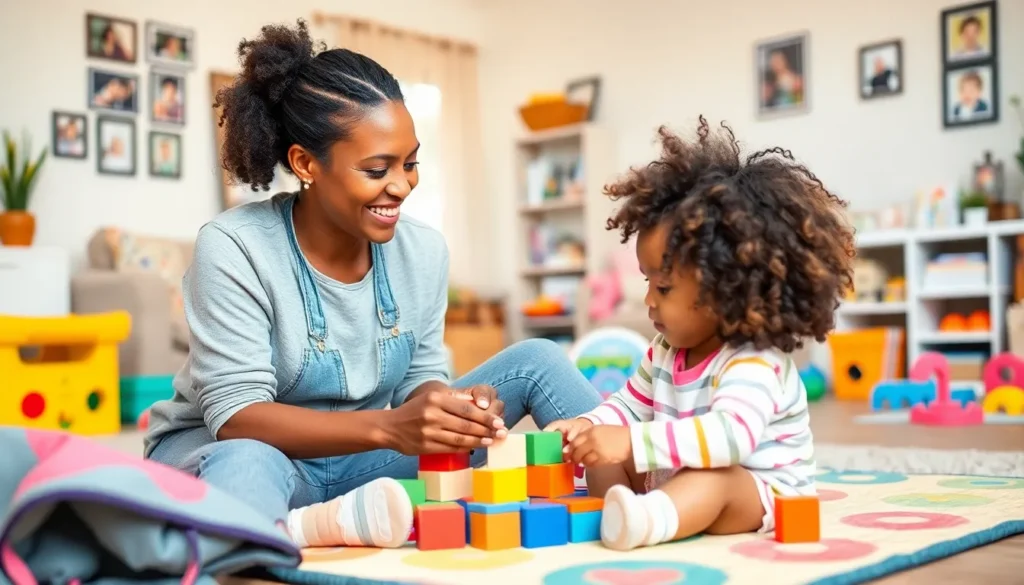Parenting can feel like a never-ending rollercoaster ride—thrilling, terrifying, and occasionally leaving you wondering if you’ve lost your lunch. Whether it’s navigating toddler tantrums or dealing with teenage eye rolls, every parent knows the struggle is real. But fear not! There’s a treasure trove of parenting solutions out there that can transform chaos into calm.
Table of Contents
ToggleUnderstanding Parenting Solutions
Parenting solutions encompass a variety of strategies and techniques designed to address the multifaceted challenges of raising children. These solutions aim to foster healthy family dynamics while promoting child development.
Defining Parenting Solutions
Parenting solutions include specific approaches, methods, and resources that assist parents in navigating everyday parenting issues. Solutions may involve behavioral strategies, communication techniques, or educational resources tailored to different age groups. Experts often categorize these solutions into areas like discipline, emotional support, and developmental guidance. Research highlights that effective parenting solutions enhance emotional intelligence and resilience in children while addressing immediate behavioral challenges.
Importance of Parenting Solutions
Parenting solutions play a crucial role in creating a harmonious home environment. Effective strategies reduce stress for both parents and children by providing clarity in challenging situations. They promote positive interactions, helping to establish trust and open communication. Studies indicate that families employing structured solutions experience improved relationships and parenting satisfaction. Access to viable solutions empowers parents to respond confidently to challenges, fostering a nurturing atmosphere conducive to healthy development.
Common Parenting Challenges

Parents encounter various challenges while raising children. Key difficulties include managing behavioral issues and overcoming communication barriers.
Behavioral Issues
Children often display behavioral issues that frustrate parents. Common examples of these behaviors include tantrums, defiance, and aggression. Addressing these challenges requires patience and consistent strategies. Establishing clear rules shapes children’s understanding of acceptable behavior. Positive reinforcement encourages good behavior and builds self-esteem. Seeking professional help may prove beneficial for persistent issues. Effective behavioral management techniques can turn challenging moments into opportunities for growth. Parents can observe patterns to identify triggers and respond proactively.
Communication Barriers
Communication barriers can complicate parent-child relationships. Misunderstandings often stem from differences in age and experience. Active listening fosters trust and openness. Parents should encourage children to express feelings and thoughts without fear of judgment. Using age-appropriate language improves clarity. Engaging in regular conversations reinforces bonds and diminishes misunderstandings. Encouraging questions invites curiosity and shows children their opinions matter. Emphasizing empathy helps children develop strong communication skills. Addressing these barriers enhances family dynamics and creates a supportive environment.
Popular Parenting Solutions
Numerous effective parenting solutions exist to foster positive family dynamics. Strategies that promote child development often focus on behavior, communication, and emotional well-being.
Positive Reinforcement
Positive reinforcement acts as a powerful tool in shaping children’s behavior. Rewarding desirable actions encourages repetition of those behaviors. For example, verbal praise for doing chores cultivates a sense of responsibility. Consistent use of tangible rewards, like stickers or special privileges, can enhance motivation. Gradually, children learn to associate good behavior with positive outcomes, leading to increased self-esteem. Implementing systems like a reward chart helps track progress while making the experience engaging and fun.
Mindfulness Techniques
Mindfulness techniques offer valuable strategies for parents seeking calmness in chaos. Fostering awareness in daily interactions enhances emotional regulation. Practices such as deep breathing or guided imagery allow children to pause and reflect before reacting. Establishing a routine that includes mindfulness activities, such as meditation or yoga, can build resilience over time. Additionally, promoting open conversations about feelings encourages emotional expression. Regularly integrating mindfulness into family life strengthens connections while teaching coping skills essential for facing challenges.
Expert Tips for Effective Parenting Solutions
Strategies for effective parenting encompass various techniques tailored to support children and families. These solutions help navigate common challenges and create a nurturing environment.
Setting Boundaries
Establishing boundaries is crucial for children’s understanding of acceptable behavior. Parents benefit from clear and consistent rules. When children know what’s expected, they feel secure and more likely to comply. Communicating these boundaries in plain language helps remove confusion. For younger children, visual aids and reminders reinforce expectations. Use positive language to frame rules, emphasizing what to do rather than what not to do. Consistency in enforcing these boundaries builds trust and respect, leading to healthier family dynamics.
Encouraging Independence
Fostering independence enables children to develop self-confidence and decision-making skills. Parents can provide opportunities for children to make choices in daily activities, promoting autonomy. Start with small tasks, such as selecting outfits or choosing snacks. Gradually increase responsibilities as children grow older. Letting children solve problems independently helps them build resilience. Encourage open discussions about their choices and outcomes, guiding them without taking over. Supporting independence nurtures a sense of competence and prepares children for future challenges.
Resources for Parents
Parents seeking guidance can explore various resources tailored to their needs. These resources provide valuable insights and practical strategies.
Books and Literature
Numerous books offer expert advice for parents navigating challenges. “The Whole-Brain Child” by Daniel J. Siegel and Tina Payne Bryson presents brain development concepts, helping parents understand behaviors. “How to Talk So Kids Will Listen & Listen So Kids Will Talk” by Adele Faber and Elaine Mazlish equips parents with effective communication techniques. “No-Drama Discipline” emphasizes discipline approaches that nurture rather than punish. These titles provide actionable strategies rooted in research. Reading diverse perspectives fosters a deeper understanding of child development, ultimately supporting healthier family dynamics.
Online Courses and Workshops
Online courses and workshops present dynamic learning opportunities. Platforms like Coursera and Udemy offer parenting courses covering topics such as effective communication and discipline strategies. Workshops led by child development experts focus on problem-solving techniques that facilitate discussions on parenting challenges. Attending webinars allows parents to engage directly with professionals, enhancing their skills. Many local organizations provide in-person workshops that promote community connections, creating support systems. Utilizing these resources empowers parents to adopt effective practices and encourages personal growth throughout their parenting journey.
Navigating the complexities of parenting can be daunting but it’s also incredibly rewarding. By embracing effective solutions and strategies, parents can transform challenges into opportunities for growth. The journey involves patience understanding and a commitment to fostering a nurturing environment.
Utilizing resources like books and workshops can further enhance parenting skills and provide essential insights. With the right tools and mindset parents can cultivate strong relationships with their children while promoting healthy development. It’s all about creating a supportive atmosphere where both parents and children can thrive together.





